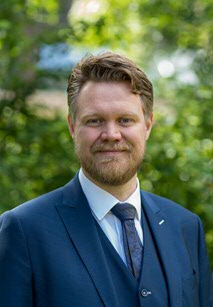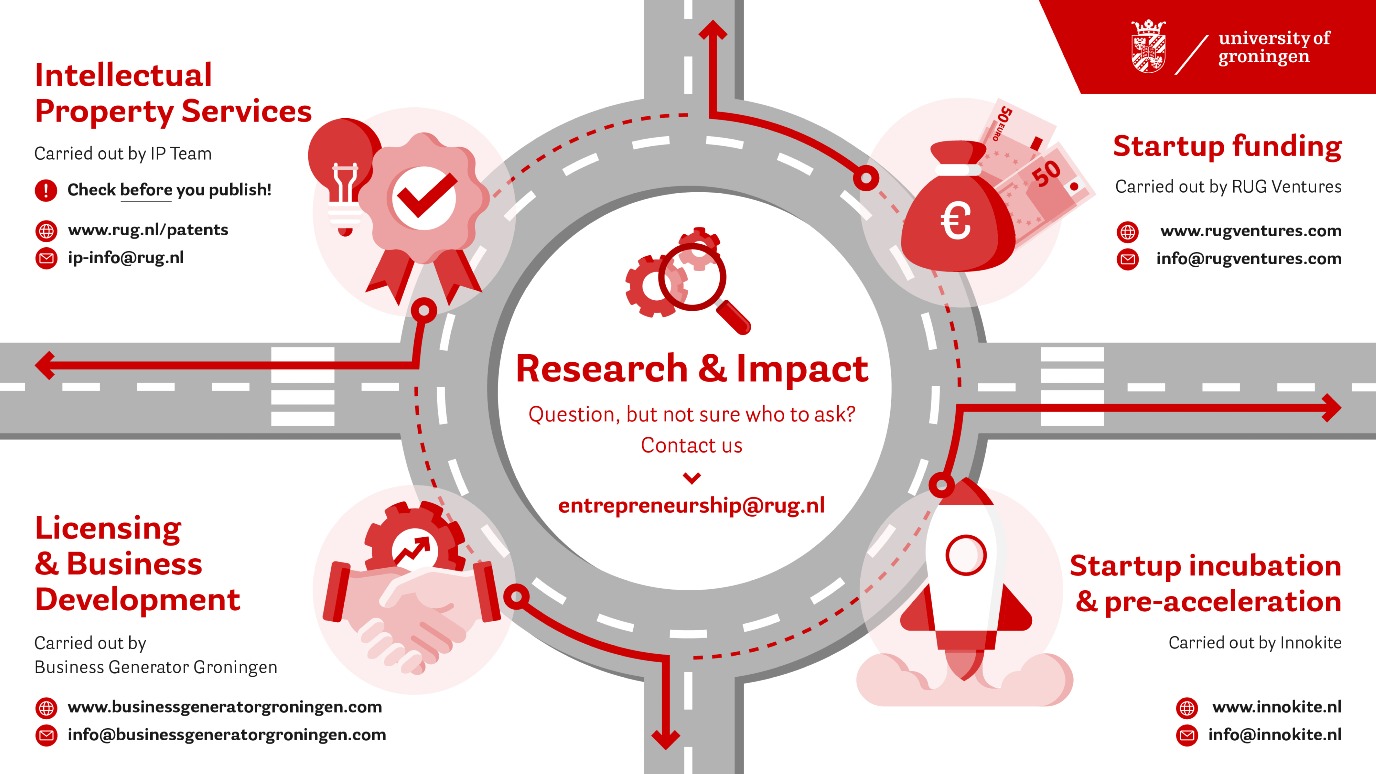Onderzoek & Impact

Het cluster Onderzoek & Impact (O&I) werkt aan het versterken van het onderzoek aan de RUG en het vergroten van de maatschappelijke impact daarvan. We bieden onderzoekers en besluitvormers praktische ondersteuning en advies, afgestemd op de universitaire strategie en de laatste ontwikkelingen in het onderzoeksveld.
Door te focussen op onder andere financiering, netwerken, ondernemerschap en kennisbenutting, helpen we onderzoekers om hun impact te vergroten en nieuwe mogelijkheden te ontdekken.
Onze dienstverlening omvat gerichte ondersteuning op universitaire speerpunten in nauwe samenwerking met de Schools voor Wetenschap & Samenleving, evenals brede basisdiensten voor de gehele onderzoeksgemeenschap samen met de faculteiten van de RUG.
“Onderzoek & Impact is een cluster dat denkt in mogelijkheden, met een focus op samenwerking, verbinden en verstandig beleid: in de breedste zin met alle onderzoekers, faculteiten en bestuurders van de RUG, op speerpunten met de Schools voor Wetenschap & Samenleving, en in nauwe verbinding met partners in onze regio, in Nederland en wereldwijd.”
- Martijn Verwegen, clusterdirecteur Onderzoek & Impact
Organisatiestructuur Onderzoek & Impact
Het cluster Onderzoek & Impact bestaat uit vier domeinen: Duurzame Consortia & Allianties, Maatschappij & Overheidsbetrekkingen, Kennisbenutting & Ondernemerschap, en Talent, Financiering & Kwaliteit.
Hieronder vind je per domein meer informatie en de contactgegevens.
Duurzame Consortia & Allianties
Bij Duurzame Consortia en Allianties zetten wij ons dagelijks in voor het leggen van verbindingen. We bouwen aan samenwerkingen met bedrijven, overheden, andere kennisinstellingen en non-profitorganisaties, gericht op het bewerkstelligen van impact van onderzoek aan de RUG. Door het maken van deze connecties dragen wij ons steentje bij aan het bouwen aan een toekomstbestendig Noord-Nederland en een duurzame wereld.
Vanuit onze expertise voorzien wij onderzoekers aan de RUG van advies en ondersteuning op het gebied van onderzoeksfinanciering. Bovendien zorgen wij ervoor dat de kennis die voortvloeit uit hun onderzoek via onze connecties maatschappelijke impact heeft.
Voor bedrijven, (semi-)overheden en andere organisaties die willen samenwerken met de RUG, zijn wij het eerste aanspreekpunt. Op basis van uw vraag verkennen wij samen met u de mogelijkheden voor vruchtbare samenwerking. Wij koppelen u aan de beste onderzoeker of dienst om er zo voor te zorgen dat de grensverleggende wetenschap die hier bedreven wordt ook daadwerkelijk maatschappelijke impact maakt.
Contact
-
Algemeen e-mailadres: secr.research.impact@rug.nl
-
Afdelingshoofd: Rita Landeweerd (Interim-manager Cluster Research & Impact, departments Consortia & Alliances and Societal & Governmental Engagement)
-
Post- en bezoekadres: Academiegebouw, Tuinvleugel, Broerstraat 5, 9712 CP Groningen
Maatschappij & Overheidsbetrekkingen
Bij Maatschappij- en Overheidsbetrekkingen richten we ons als team op twee kernactiviteiten: public affairs en public engagement. We werken aan het vormgeven van de dialoog met maatschappij en overheid om gezamenlijke ideeën te ontwikkelen voor (toekomstige) onderzoeksagenda's, missies en het onderliggende beleid. Ons team heeft een speciale focus op de Schools voor Wetenschap & Samenleving en hun verbinding met de Universiteit van het Noorden.
-
Afdelingshoofd: Peggy van Vliet
-
Contact: p.van.vliet@rug.nl
Public Affairs
Wij zetten ons dagelijks in om Groningen dichter bij Den Haag en Brussel te brengen en vice versa.
We ontwikkelen en onderhouden relaties in Brussel, Den Haag en Noord-Nederland met beleidsmakers, politici, strategische partners, universitaire netwerken en andere stakeholders. We nemen actief deel aan netwerk- en lobbyorganisaties (The Guild, Neth-ER, Coimbra Group, EUA, UNL, SER, AWTI, NERA SNN, Akkoord van Groningen, Universiteit van het Noorden etc.) en leveren input. Ook leveren wij input voor toekomstig beleid van Onderzoek & Impact en financieringsprogramma's door overleg met beleidsmakers en stakeholders in Brussel en Den Haag het showcasen van expertise, projecten en programma’s, het reageren op consultaties en via (het organiseren van) werkbezoeken in Den Haag, Brussel of Groningen.
Ook bieden wij inlichtingen en strategisch advies over de ontwikkelingen omtrent onderzoeks- en innovatiebeleid en financieringsprogramma’s (Horizon Europe en het volgende Kaderprogramma KP10, de Europese Onderzoeksruimte, het Meerjarig Financieel Kader, De Nationale Technologie Strategie, Invest-NL, Topsectoren (TKI), Nij Begun, RIS3 enz.). Daarnaast bieden we inzichten en praktische begeleiding aan onderzoekers over hoe ze zich het beste kunnen voorbereiden op de komende veranderingen, hoe ze zichtbaarder kunnen worden en bieden we ondersteuning om hen te nomineren voor expertgroepen.
Contact Public Affairs
-
Martijn Röfekamp - Public Affairs Brussel / m.rofekamp@rug.nl
-
Kevin Kruiter - Public Affairs Den Haag / k.m.kruiter@rug.nl
-
Bart Talens - Public Affairs Noord-Nederland / b.j.talens@rug.nl
Public Engagement
We zetten ons dagelijks in om de zichtbaarheid van de Rijksuniversiteit Groningen en haar onderzoekers te vergroten.
Vanuit de bruisende locatie aan de Grote Markt, het House of Connections, maken we door middel van het organiseren van evenementen en activiteiten zichtbaar op welke manier wetenschap bijdraagt aan het oplossen van grote maatschappelijke problemen. We denken mee met de invulling van evenementen, onderzoeken hoe we de grootste impact kunnen maken en faciliteren bij de organisatie van evenementen en activiteiten. Dit doen we in samenwerking met een grote verscheidenheid aan partijen zoals de Schools for Science & Society, Universiteit van het Noorden, Teaching Academy Groningen, ENLIGHT, Young Academy Groningen, Studium Generale, de impactorganisatie van de universiteit en nog vele andere interne en externe partijen.
De public engagement richt zich ook op profilering en positionering van RUG-wetenschappers en hun expertise. Zo wordt er media-, pitch- en lobby-coaching aangeboden en verbeteren we de (online) zichtbaarheid van onderzoekers door impact en wetenschapsjournalistiek. Dit kan in verschillende vormen, zoals nieuwsberichten, interviews, achtergrondverhalen, reportages, podcasts en video’s. Daarnaast bieden we begeleiding bij perscontacten en samenwerkingen tussen wetenschappers en journalisten.
Contact Public Engagement
-
Algemene zaken House of Connections: houseofconnections@rug.nl
-
Floor Kuiper - Programmamanager House of Connections / f.kuiper@rug.nl
-
Marcella Oldenhuizing - Event Manager Schools for Science & Society / m.r.oldenhuizing@rug.nl
-
Jelle Posthuma - Impact Journalist RUG / j.posthuma@rug.nl
Kennisbenutting & Ondernemerschap
Het domein Kennisbenutting & Ondernemerschap richt zich op het genereren van economische groei en maatschappelijke impact door wetenschappelijke kennis te benutten. Als onderdeel hiervan ondersteunen we onderzoekers en studenten om kennis in de praktijk te brengen.
Er zijn verschillende manieren om dit te bereiken; we kunnen helpen bij het beschermen van intellectueel eigendom, onderzoekers en studenten ondersteunen bij het verkennen en ontwikkelen van ondernemerspraktijken, ondersteuning bij licenties, toegang tot (pre)seed financiering, workshops verzorgen over gerelateerde onderwerpen en vragen beantwoorden over de impact en waardecreatie van onderzoek.
We werken nauw samen met lokale, regionale en nationale ecosystemen voor impact, ondernemerschap en valorisatie.
Het domein ondersteunt ook studenten in het Top Ondernemerschap Arrangement (TOR), het arrangement biedt een raamwerk voor het ondersteunen van studentondernemers aan de Rijksuniversiteit Groningen. De TOR erkent de unieke behoeften van studenten die tijdens hun studie een eigen bedrijf runnen en daarin werken, en schetst tegelijkertijd de voordelen en verantwoordelijkheden die gepaard gaan met het bereiken van de status van topondernemer.
Het domein bestaat uit vier samenwerkende afdelingen die specifieke vragen kunnen beantwoorden:
-
Het IP-team kan je helpen met advies en informatie over intellectueel eigendom (IP).
-
Business Generator Groningen is beschikbaar voor ondersteuning bij bedrijfsontwikkeling en het in licentie geven van IP aan je eigen startup of een extern bedrijf.
-
Innokite is de incubator voor kennisintensieve start-ups in Noord-Nederland. Innokite biedt co-working-ruimtes, relevante worksops en mentoring, en toegang tot een uitgebreid netwerk om je te helpen je start-updoelen te bereiken.
-
RUG Ventures is de investeringsmaatschappij die verbonden is aan de universiteit en die je kan helpen om je startup uit te laten groeien tot een succesvol bedrijf.
Als je vragen hebt over de top ondernemerschapsregeling voor studenten, impactcreatie, valorisatie en ondernemerschap, neem dan gerust contact met ons op.
Contact
-
Algemeen contactadres: entrepreneurship@rug.nl
IP-team
-
ip-info@rug.nl
Business Generator Groningen
-
info@businessgeneratorgroningen.com
Innokite
-
info@innokite.nl
RUG Ventures
-
info@rugventures.com
Correspondentie en bezoekadres
-
Kennisbenutting en Ondernemerschap, Kadijk 4, 9747 AT Groningen
-
Domeinhoofd: Joost Breukink

Talent, Financiering & Kwaliteit
Het domein Talent, Financiering en Kwaliteit (TFQ) is verantwoordelijk voor beleid en ondersteuning met betrekking tot het financieren en uitvoeren van onderzoek en het erkennen van belangrijke onderzoeksprestaties. De teamleden van TFQ richten zich op beleid en instrumenten die hoogwaardig, impactvol en innovatief onderzoek binnen de hele Rijksuniversiteit Groningen (RUG) kunnen bevorderen, en die academici kunnen helpen zich aan te passen aan veranderende onderzoekstrends en -culturen. We adviseren en ondersteunen het College van Bestuur en de faculteiten bij het realiseren, borgen en verbeteren van de kwaliteit en impact van onderzoek aan onze universiteit.
Het TFQ-domein volgt en reageert op onderzoeksbeleid en financieringsmogelijkheden in Nederland, de Europese Unie en daarbuiten. De leden onderhouden contacten met het ministerie van Onderwijs, Cultuur en Wetenschap, de Europese Onderzoeksraad (ERC), de Nederlandse Organisatie voor Wetenschappelijk Onderzoek (NWO), de bredere onderzoeksgemeenschap van de RUG en andere belanghebbenden om onderzoeksondersteuning en -sturing te bieden aan afgestudeerde RUG-studenten en aan zowel beginnende als gevestigde onderzoekers. We coördineren en/of ondersteunen strategische programma's aan de RUG, zoals de Young Academy Groningen, Erkennen & Waarderen, de Graduate Schools en ENLIGHT.
Via het Talentontwikkelingsteam van TFQ kunnen RUG-onderzoekers training krijgen voor NWO-subsidieaanvragen of om zich voor te bereiden op interviews met betrekking tot een NWO- of ERC-subsidieregeling. Het Talent Development-team biedt ook individuele redactionele ondersteuning voor NWO- en ERC-subsidies en ondersteunt nominaties voor grote prijzen en lidmaatschapp en ter erkenning van het buitengewone talent dat de RUG voortbrengt.
Contact
-
Talentontwikkeling training: talent@rug.nl
-
Talentontwikkeling redactie: editingtd@rug.nl
-
Correspondentie- en bezoekadres: Broerstraat 5, 9712 CP, Groningen
-
Afdelingssecretaresse: Debbie Berendes, secr.research.impact@rug.nl
-
Afdelingshoofd: Maarten Schunselaar
Research Support Portal
Binnen Onderzoek & Impact ligt er een grote focus op de ondersteuning van onderzoekers in alle facetten van hun onderzoek. Om deze verschillende onderdelen en fasen van onderzoek inzichtelijk te maken, is de Research Support Portal ontwikkeld. Deze portal biedt toegang en overzicht tot alle onderzoeksondersteuning die door de verschillende diensten en faculteiten is opgezet.
| Laatst gewijzigd: | 29 januari 2025 10:31 |
